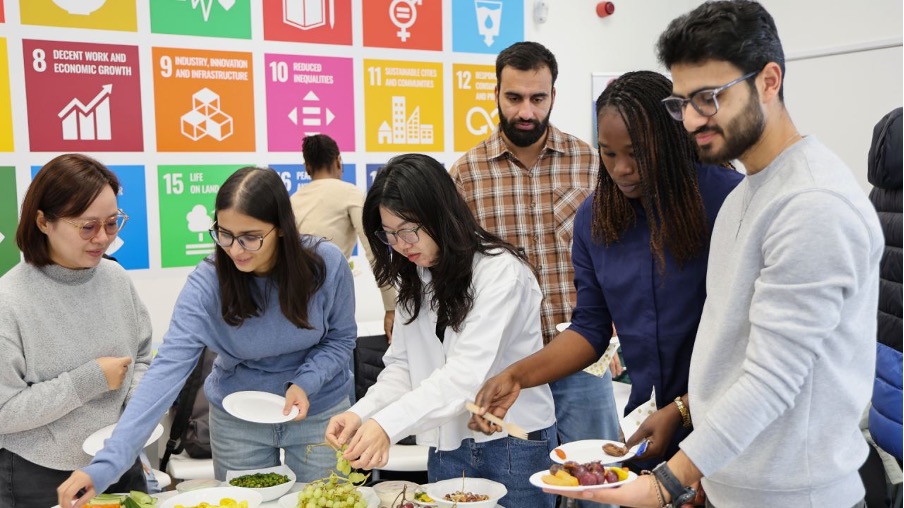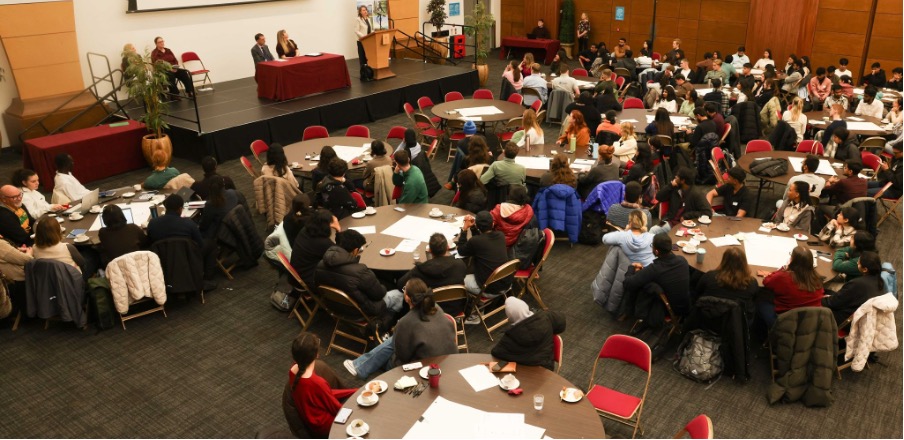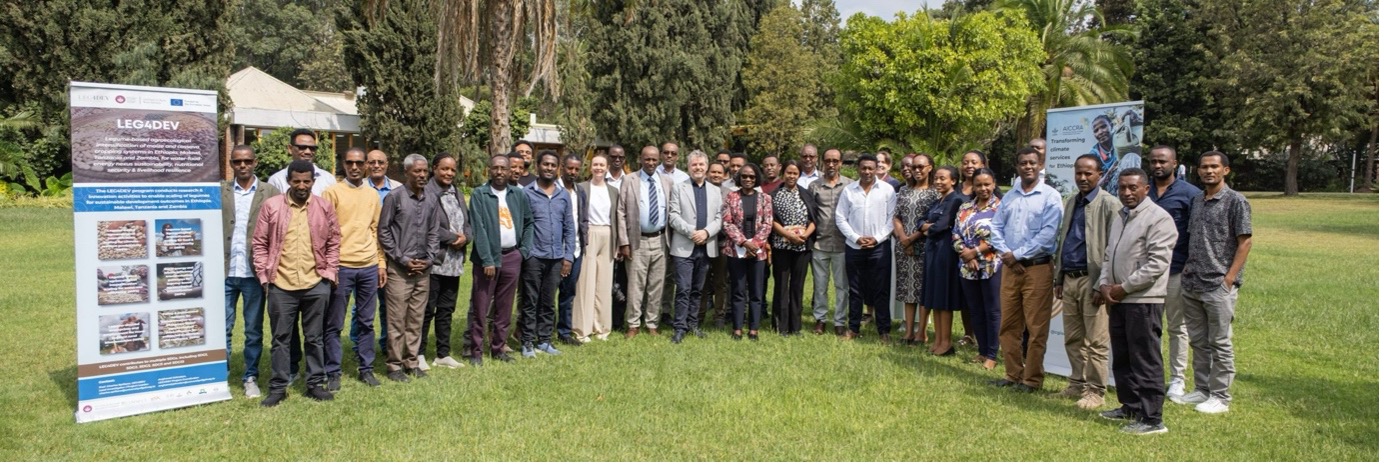-
Courses

Courses
Choosing a course is one of the most important decisions you'll ever make! View our courses and see what our students and lecturers have to say about the courses you are interested in at the links below.
-
University Life

University Life
Each year more than 4,000 choose University of Galway as their University of choice. Find out what life at University of Galway is all about here.
-
About University of Galway

About University of Galway
Since 1845, University of Galway has been sharing the highest quality teaching and research with Ireland and the world. Find out what makes our University so special – from our distinguished history to the latest news and campus developments.
-
Colleges & Schools

Colleges & Schools
University of Galway has earned international recognition as a research-led university with a commitment to top quality teaching across a range of key areas of expertise.
-
Research & Innovation

Research & Innovation
University of Galway’s vibrant research community take on some of the most pressing challenges of our times.
-
Business & Industry

Guiding Breakthrough Research at University of Galway
We explore and facilitate commercial opportunities for the research community at University of Galway, as well as facilitating industry partnership.
-
Alumni & Friends

Alumni & Friends
There are 128,000 University of Galway alumni worldwide. Stay connected to your alumni community! Join our social networks and update your details online.
-
Community Engagement

Community Engagement
At University of Galway, we believe that the best learning takes place when you apply what you learn in a real world context. That's why many of our courses include work placements or community projects.
Climate Change, Agriculture & Food Security (MSc)
MSc (Climate Change, Agriculture and Food Security)
College of Science and Engineering- Title of Award
- Master of Science
- Course Code
- MSC-MCA
- Average Intake
- 30
- Delivery
- On Campus
- NFQ
- Level 9
- Award Type
- Major
- Next Intake
- September 2026
- Duration
- 1 year, full-time
- ECTS Weighting
- 90
Why Choose This Course?
Course Information
Who is this course for?
As the climate change challenge for sustainable development on the planet intensifies, there is a need in all organisations for personnel skilled in both climate change adaptation and mitigation strategies for the development of greener economies, agrifood systems and low-environmental footprint supply chains. Achieving the goals of the Paris Agreement on Climate Change will require transformation of food and agricultural systems worldwide, while the most marginalised farmers and communities must be helped to adapt to climate change through a just transition.
Graduates of the MScCCAFS are extremely well positioned for strategic “change agent” positions in government, policy, research, enterprise, business, administration and other activities across a wide range of public and private sector institutions internationally.
Career mentoring, advice, strategy and facilitation is provided to all students on the MScCCAFS program to ensure that they rapidly enter employment in relevant institutions and activities, where they can build from their interests, experience and training. The MScCCAFS program at University of Galway has a Theory of Change where the impact of the program on climate change, agriculture and food security globally is realised through our graduates.
What will I study?
The full-time programme comprises three seminar courses during the academic year, taken as a full-time degree taken over a twelve-month period (September to August). The year is divided into two teaching semesters (September to December and January to April). The summer period is used to complete.
The MSc in Climate Change, Agriculture and Food Security (MScCCAFS) is run by the School of Biological & Chemical Sciences, and aligned with the interdisciplinary Ryan Institute at the University of Galway. The course is delivered by leading experts on climate, change, agriculture and food security, in addition to many international experts and researchers who act as guest lecturers on the latest cutting edge thinking and topics.
Every module is aligned with the Sustainable Development Goals (SDGs), especially SDG2: Zero Hunger, SDG13: Climate Action and SDG15: Life on Land. There is also an important focus on social equity, including gender equality and climate justice, and the need for just transitions.
All modules are taught by world-leading scientists, thinkers and researchers in their areas of expertise. Students will encounter a wide variety of teaching methods including web-based learning, lectures, exercises, seminars, excursions and group/project work. Students also attend high-profile events organised by the Irish Forum for International Agricultural Development (https://ifiad.ie/).
The MScCCAFS program has strong partnership linkages to international development organisations globally, including across the UN System, the Consultative Group on International Agricultural Research (CGIAR) and leading international development NGOs.
The MScCCAFS builds your knowledge, skills and experiences across the broad fields of climate change, agri-food systems and food security. Taught modules are delivered by leading experts in these fields from the University and from guest lecturers around the world.
Our alumnus network includes graduates who are based in dozens of countries worldwide, in increasingly leading roles across government, research institutions, NGOs, companies, consultancies, universities and other entities.
Career mentoring, advice, strategy and facilitation is provided to all students on the MScCCAFS program to ensure that they can rapidly enter employment in relevant institutions and activities, where they can build from their interests, experience and training. The MScCCAFS program at University of Galway has a Theory of Change where the impact of the program on climate change, agriculture and food security globally is realised through our graduates.
Examples of current roles of past MScCCAFS graduates include:
- AI and Strategy Consultant for International Finance Corporation (IFC)/ World Bank Group.
- Postdoctoral Fellow on land-use planning for climate mitigation pathways to net zero.
- University Lecturer on climate change, agriculture and food security.
- Program Officer, Food and Agriculture Organization of the United Nations (FAO).
- Project coordinator at CGIAR Hub for Sustainable Finance.
- Consultant, Sustainable Agricultural Value Chains at South Pole.
- Program Officer, Ireland’s Climate Change Advisory Council.
- Research Fellow, Environmental Change Institute (ECI), University of Oxford.
- Political Advisor, President of South Africa.
- Food and Agribusiness Analyst, Farrelly & Mitchell, Dublin.
- Youth Policy Board Member at the FAO’s World Food Forum Youth Assembly, leading the Bioeconomy thematic area.
- Business Sustainability Specialist at Bord Bia.
- Sustainability Specialist at Ornua Foods.
- Associate, Climate Rights International, San Francisco, USA.
- Researcher, Wageningen Economic Research (WEcR) institute, Netherlands.
- Environmental & Sustainability Officer, Midlands Meats, Ireland.
- Coordinator, Climate Systems Analysis Group, University of Cape Town.
- Project Manager, Forest Stewardship Council, Germany.
- Environmental Scientist, Jennings O'Donovan & Partners.
- CEO GreenEnergy Pacific, Port Moresby, Papua New Guinea.
How Will I Be Assessed?
A range of assessment methods are integrated and applied throughout the MScCCAFS.
These include reports, data exercises, group presentations, online literature tests, and analysis of policy case studies. All students prepare receive communications and career training and produce a publication-style Thesis after their MScCCAFS research project.
Student engagement with many launches, symposia and visiting speakers is built into our modules, including visits to national Teagasc research centres, making online presentations critically evaluating progress in climate negotiations at the UNFCCC COP Climate Summits, and attending the Annual Conference of the Irish Forum for International Agricultural Development (IFIAD).
Both individual exercises and group work are integrated into our assessment, and peer-to-peer learning is an important element of the student experience.
EAT-Lancet Panel Discussion

Masters students from the MSc in Climate Change, Agriculture and Food Security (MScCCAFS) recently attended a panel discussion on the latest EAT-Lancet Report. The event, run jointly by the Ryan Institute at the University of Galway with IFIAD, featured a panel discussion with course coordinator Dr. Peter McKeown and graduates Dr. Noel Ndlovu and Angharad Johnston. Students enjoyed sampling EAT-Lancet compatible foods during the event as well.
Participation in 10th Anniversary Galway Climathon

The MScCCAFS class recently attended the Ryan Institute’s 10th Climathon! The annual event challenges students, researchers, entrepreneurs and members of the public to pitch innovative ideas to enhance Galway City’s sustainability.
Completion of research surveys with smallholders in Zambia by Irish Aid-funded students
MSc CCAFS students Mukwiza Halwindi and Paul Kakumba recently wrapped up their research surveys, completed as part of their thesis work under the Legumes for Development (LEG4DEV) project.
Incoming class attend National Ploughing Championships
In yearly tradition, the MScCCAFS cohort attended the National Ploughing Championship in County Offaly. Students met with farmers, entrepreneurs and food system specialists across Ireland’s agricultural system.
Vietnamese Masters students meet with Ministers for Agriculture in Vietnam and Ireland
The 2024/25 Ireland Vietnam Agrifood Partnership (IVAP) Fellows met with Minister of State Noel Grealish recently, following the Minister’s visit to Vietnam. The fellows are studying in MScCCAFS, MScAST and MIDP courses through the support of the Ireland Vietnam Agrifood Partnership (IVAP), implemented by Sustainable Food Systems Ireland (SFSI) and funded by the Embassy of Ireland in Vietnam.
MSc graduates publish theses in academic journals
MScCCAFS graduates work with MScCCAFS faculty where possible to published their research work in academic journals.
- Margareth Mollel, Programme Officer on Global Communities, has published her MScCCAFS thesis research, ‘Digital technologies to accelerate the impact of climate smart agriculture by next-generation farmers in Africa’ in Frontiers in Sustainable Food Systems.
- Jacinta Barrins, who has been leading the innovative 6 step Climate Course since graduation, published her MScCCAFS thesis work, ‘What constitutes “institutional arrangements” for Member State reporting within the UNFCCC and Paris Agreement?’ in PLOS Climate.
- Caitlin Breen, Business Sustainability Specialist at Bord Bia, has published her MScCCAGS thesis work: Legume seed system performance in sub-Saharan Africa: barriers, opportunities, and scaling options. A review’ in Springer Nature’s Agronomy for Sustainable Development.
Congratulations to our students for an outstanding achievement!
MScCCAFS graduate Noel Ndlovu awarded PhD
MScCCAFS graduate, Dr. Noel Ndlovu recently received his PhD in ‘Machine learning and genomics based LCA to optimize productivity and environmental sustainability’.
We are incredibly proud of Noel’s achievement and delighted that he will continue his research and teaching as a Lecturer on the MSc CCAFS program.
MScCCAFS graduate Angharad Johnston works on legume scaling in sub-Saharan Africa

MScCCAFS graduate Angharad Johnston recently returned from field trips to Ethiopia and Kenya as part of her work as Project Manager on the Legumes for Development (LEG4DEV) project. Angharad, who has been working with Prof. Charles Spillane as Project Manager of the €7.2 million EU-funded LEG4DEV project, represented the project at CGIAR’s inaugural Science Week in Nairobi, Kenya in April.
All members of our MScCCAFS Faculty are world-leading researchers in their fields of interest. More than 20 MScCCAFS theses have given rise to subsequent publications, which are consistently geared to the production of peer-reviewed publications, or of working papers of direct relevance for partner organisations or other stakeholders.
Examples include:
Fundira T et al. (2025) ‘Entrepreneurship pathways for scaling legume-based agroecological intensification in Eastern and Southern Africa. A review’, Journal of Agriculture and Food Research.
Barrens et al. (2025) ‘What constitutes “institutional arrangements” for Member State reporting for UNFCCC and the Paris Agreement?’ PLoS Climate.
Ndlovu et al. (2024) ‘Genomic loci associated with grain yield under well-watered and water-stressed conditions through linkage mapping and genomic selection in multiple bi-parental maize populations’, Frontiers in Sustainable Food Systems.
Silchenko et al. (2023) ‘Assessing the Evidence: Migration, Environment and Climate Change in Ireland’. International Organization for Migration, Dublin.
Rehberger et al. (2023) ‘What climate and environmental benefits of regenerative agriculture practices? an evidence review’, Environmental Research Communications.
Liddy et al. (2023) ‘Food mapping approaches for understanding food system transitions in rapid-growth city regions in the Global South’, Frontiers in Sustainable Food Systems.
Huber et al. (2023) ‘Climate-related migration & the climate-security-migration nexus in the C. American Dry Corridor’, Climatic Change.
Ferguson et al (2022) ‘Can remote sensing enable a Biomass Climate Adaptation Index for agricultural systems?’, Frontiers in Climate.
Hanley et al (2021) ‘Impacts of climate smart agriculture interventions on food security and diet diversity in climate smart villages in Myanmar: Insights from community level studies’, Climate Journal.
McLaughlin et al. (2020) ‘Development and Impact Monitoring of a Communication Strategy for the CGIAR Climate Security Program’, CCAFS Working Papers.
Colgan J, McDougall C, Murray U, Spillane C, McKeown PC, Hossain M (2019) ‘Can climate-smart aquaculture enable women's empowerment in Bangladesh?’ WorldFish, Penang, Malaysia.
Costelloe et al. (2018) ‘A strategic approach to collaborative resource mobilization for climate change, agriculture and food security research’. CCAFS Info Note. Wageningen, Netherlands: CGIAR Research Program on Climate Change, Agriculture and Food Security (CCAFS).
Petitti et al. (2018) ‘Future proofing decentralised evolutionary wheat populations’ seed systems in Italy using a climate analogues approach: the example of Tuscany’, Proc. Symp. Breeding for Diversification.
Course queries:
una.canney@universityofgalway.ie
Programme Director:
Dr. Peter McKeown,
E: peter.mckeown@universityofgalway.ie
School of Biological & Chemical Sciences
College of Science and Engineering
University of Galway recognises that knowledge and skills can be acquired from a range of learning experiences. This is in line with the National Framework of Qualifications (NFQ) goals which aim to recognise all learning achievements by supporting the development of alternative pathways to qualifications (or awards) and by facilitating the recognition of prior learning (RPL) and prior experiential learning (RPEL).
Candidates who do not meet the usual entry requirements may be eligible for consideration under this scheme and are encouraged to contact the MScCCAFS Coordinator, Dr. Peter McKeown, for guidance.
Graduates of the MScCCAFS will be able to:
- Demonstrate a breadth of understanding of the complexities of climate change, agriculture & food security topics.
- Apply systems learning and circular bioeconomy approach to critically evaluate proposed solutions for agricultural resilience and food systems transformation.
- Work individually and in groups to make presentations describing outcomes of negotiations at COP Climate Summit meetings.
- Develop tools for improved climate communication and stakeholder engagement.
- Develop research study skills which may incorporate qualitative, quantitative and mixed methods approaches.
- Gain familiarity with a breadth of tools for CCAFS advances, including survey-based approaches, climate scenarios, crop modelling, GIS and statistical approaches.
- Develop their strengths and confidence in self-directed learning, technically proficient English and critical analysis of supporting policy documents.
Accreditations & Awards
Meet our Employers
Entry Requirements and Fees
Minimum Entry Requirements
Candidates must normally hold at least a Second Class Honours Level 8 primary degree in a related subject area, or have relevant equivalent experiential learning.
Academic entry requirements standardised per country are available here.
English Language Entry Requirements
For applicants whose first language is not English and who have not recently studied through English, an English language proficiency of IELTS score of 6.5 is required (with no less than 5.5 in any band) or equivalent.
More information on English language test equivalency are available here.
You can apply online to the University of Galway application portal here.
Please review the entry requirements set out in the section above.
You will be required to upload supporting documentation to your application electronically. See the section above on entry requirements for further information on the supporting documentation required for this course.
Closing Dates
For this programme, there is no specific closing date for receipt of applications. Applications will be accepted on a rolling basis and course quotes will be reviewed continuously throughout the application cycle.
Notes
- You will need an active email account to use the website and you'll be guided through the system, step by step, until you complete the online form.
- Browse the FAQ's section for further guidance.
Fees for Academic Year 2026/27
| Course Type | Year | EU Tuition | Student Contribution | Non-EU Tuition | Levy | Total Fee | Total EU Fee | Total Non-EU Fee |
|---|---|---|---|---|---|---|---|---|
| Masters Full Time | 1 | €8,900 | €28,500 | €140 | €9,040 | €28,640 |
For 26/27 entrants, where the course duration is greater than 1 year, there is an inflationary increase approved of 1.8% per annum for continuing years fees.
Postgraduate students in receipt of a SUSI grant – please note an F4 grant is where SUSI will pay €4,500 towards your tuition (2026/27). You will be liable for the remainder of the total fee. A P1 grant is where SUSI will pay tuition up to a maximum of €6,270. SUSI will not cover the student levy of €140.
Note to non-EU students: learn about the 24-month Stayback Visa here.
Postgraduate Excellence Scholarships
This scholarship is valued at €1,500 for EU students applying for full-time taught master's postgraduate courses. You will be eligible if:
- You have been accepted to a full-time taught master's course at University of Galway,
- You have attained a first class honours (or equivalent) in a Level 8 primary degree.
An application for the scholarship scheme is required (separate to the application for a place on the programme). The application portal for 2025 is now open and available here. Applications will close on the 30th September 2025. Full details available here.
Global Scholarships
University of Galway offers a range of merit-based scholarships to students from a number of countries outside of the EU. Visit here for schemes currently available.
Application Process
Students applying for full time postgraduate programmes from outside of the European Union (EU), You can apply online to the University of Galway application portal here.
Our application portal opens on the 1st October each year for entry the following September.
Further Information
Please visit the postgraduate admissions webpage for further information on closing dates, documentation requirements, application fees and the application process.
Why University of Galway?
World renowned research led university nestled in the vibrant heart of Galway city on Ireland's scenic West Coast.
Downloads
Meet Our Alumni
Course Introduction
The MScCCAFS program provides motivated students with cutting-edge knowledge and skills in climate change, agriculture, and food security. Our classes are international and multidisciplinary, where we accept students from any background. Our graduates are “Agents of Change” who enable climate mitigation, adaptation, resilience and just transitions in agriculture and food systems globally.














.png)












